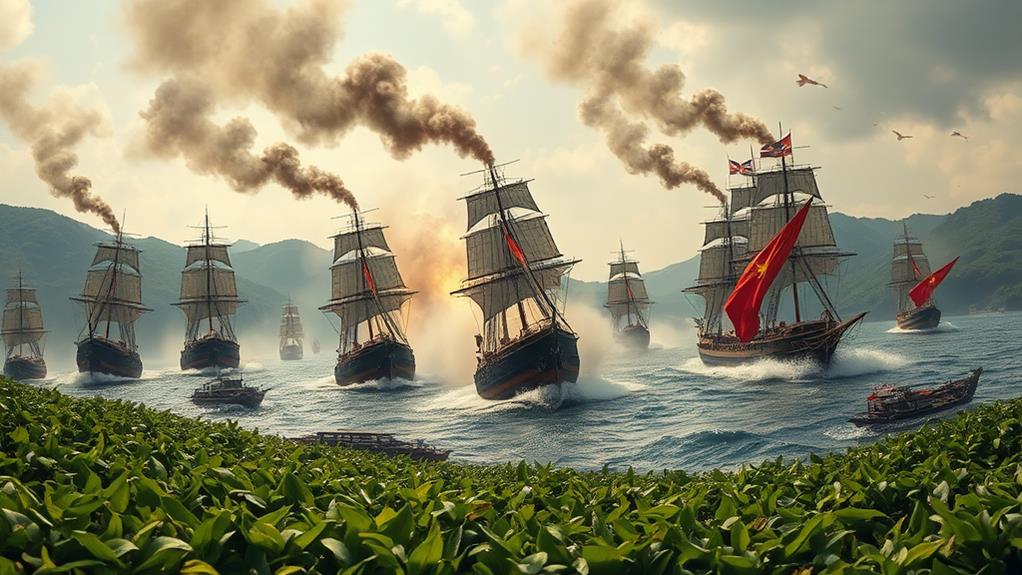You might think tea is just a drink, but it played a huge role in the Opium Wars! In the 1800s, Britain wanted more tea, so they traded opium with China. This led to addiction and suppliers battling over profits. When China tried to stop the opium trade, tensions grew, sparking the First Opium War. The conflict showed how far the British would go to control trade. Ultimately, the wars caused big changes in China, fueling nationalism and cultural pride. So, next time you enjoy tea, remember its surprising history and the events it triggered! There's even more to discover about this fascinating topic.
The Rise of Tea Consumption
The growing popularity of tea in the 18th and 19th centuries transformed social customs and economic practices in many cultures. You'll find that tea culture blossomed, creating new rituals and gatherings, such as the elegant afternoon tea parties that became a staple in British society.
Suddenly, having tea wasn't just about drinking; it became a social event. People started hosting afternoon tea parties, inviting friends to enjoy this delightful beverage together.
This shift didn't just change how folks connected; it had a significant economic impact too. As demand for tea skyrocketed, it fueled trade routes and drove economies, especially in places like Britain.
Tea became a symbol of status and sophistication, making it a hot commodity. Merchants raced to import tea from Asia, leading to booming businesses and new markets.
You might be surprised to learn that tea's rise even sparked innovations in packaging and shipping methods, as traders sought ways to keep their precious cargo fresh.
In this vibrant climate, tea wasn't merely a drink; it became a catalyst for change, weaving itself into the very fabric of society.
The Opium Trade Begins
As tea's popularity soared in Europe, a parallel trade emerged that would have profound implications for global relations: the opium trade. This trade began in the early 19th century, as merchants sought to capitalize on the lucrative market for opium, derived from poppies.
As you dive into this fascinating era, consider the following points:
- Desire for Wealth: European traders quickly recognized the profits they could make, creating a frenzy of trade routes connecting India and China.
- Cultural Impact: Opium's origins date back to ancient times, but its use in the 1800s transformed societies, leading to addiction and social strife.
- Conflict and Consequence: The booming opium trade led to significant economic and social consequences, igniting tensions that would alter the course of history.
These trade routes weren't just about commerce; they represented a clash of cultures and a shift in power dynamics.
As you explore how the opium trade began, think about the lasting effects it had on nations and their people. It's a reminder that behind every cup of tea, there's often a complex story waiting to unfold.
Conflicts Erupt: The First War
Tensions escalated rapidly in the early 1840s, setting the stage for the First Opium War between Britain and China. As you dive into this conflict, you'll see how British expansion fueled a desire for control over trade routes and markets. The British were eager to balance trade, especially since they were importing vast quantities of tea from China.
However, the Chinese resisted these foreign pressures, leading to a clash of cultures and ideals. When the British pushed opium into China, seeking to balance their trade deficit, it sparked outrage. The Chinese government, worried about the devastating effects of opium addiction on its people, took action. They seized opium stocks, which only intensified the conflict.
The British, viewing this as an affront to their commercial interests, responded with military force, igniting the First Opium War. This war wasn't just a battle over trade; it had a profound cultural impact. It exposed the vulnerabilities of a rigidly traditional society against an aggressive imperial power.
As you explore the unfolding events, think about how this conflict paved the way for future interactions between East and West, forever altering the course of history.
Consequences of the Second War
Devastation followed the Second Opium War, leaving a lasting impact on both China and Western powers. The conflict didn't just reshape borders; it sparked major changes that would ripple through time. You might even say the war opened a Pandora's box of consequences, especially in terms of economic impact and cultural shifts.
Here are three key areas to consider:
- Economic Disruption: China's economy faced chaos. With trade routes altered, local businesses struggled, and the influx of opium caused significant social and financial strain.
- Cultural Shifts: Western influence surged, leading to a clash of traditions. As foreign ideas poured in, Chinese culture began to transform, creating a blend that was both exciting and unsettling.
- Political Repercussions: The Qing Dynasty weakened, losing face and power. This loss fueled internal strife, setting the stage for future revolutions.
These changes didn't just affect the present; they paved the way for modern China and the global economy. By understanding these consequences, you gain insight into how past events can shape futures in unexpected ways.
Legacy of the Opium Wars
The aftermath of the Opium Wars left a complex legacy that continues to influence China and its relationship with the West today. You can see the cultural impact in how both societies view each other, shaped by a history of conflict and misunderstanding. These wars fueled a sense of nationalism in China, prompting movements to reclaim cultural pride. This spirit of innovation has driven many modern Chinese initiatives aimed at bridging gaps with the West.
Economically, the repercussions were profound. The wars opened China to foreign markets, but they also led to exploitation and unequal trade agreements. While some Western nations profited immensely, many regions in China faced economic struggles. This imbalance sparked debates that still resonate today, as both sides strive for fairer trade practices.
In today's world, the lessons from the Opium Wars remind us of the importance of respect and understanding. By learning about this turbulent history, you can appreciate the complexities of international relations and recognize the need for collaboration in an ever-changing global landscape.
Together, embracing innovation while acknowledging the past can lead to a brighter future for everyone involved.
FAQ
How Did Tea Influence British Culture During the Opium Wars?
Tea consumption shaped British identity, fostering social connections and cultural rituals. You'll find that its significance transcends mere beverage; it's a symbol of innovation, reflecting the era's shifting values and attitudes toward commerce and global relationships.
What Role Did China Play in the Global Economy During This Period?
In 1830, China accounted for 33% of global trade, showcasing its immense economic influence. You'll see how these trade dynamics shaped international commerce, driving innovation and competition that transformed markets worldwide during this pivotal era.
Were There Any Significant Female Figures Involved in the Opium Wars?
You'll find that significant female figures, like female activists and imperial wives, played crucial roles during this tumultuous period. Their influence shaped public opinion and challenged societal norms, driving innovative changes in their respective spheres.
How Did the Opium Wars Affect China's Modern History?
The opium trade was a storm that reshaped China's shores. You'll see how imperial conflicts carved pathways to modernity, influencing policies, societal structures, and national identity, ultimately redefining China's role in the global landscape.
What Were the Health Effects of Opium Use in Britain?
Opium addiction in Britain led to widespread public health issues, including increased mortality rates, mental health decline, and social disintegration. You'll find these effects inspired innovative approaches to addiction treatment and public health reform.
Final Thoughts
In the end, the Opium Wars show us how something as simple as tea can brew conflict and change the course of history. As nations clashed over trade and power, the ripple effects reached far and wide, shaping societies and relationships. Understanding this chapter reminds us that even the most ordinary things can stir up extraordinary consequences. So, next time you sip your tea, think about the battles fought over it and the lessons we can learn from the past.



